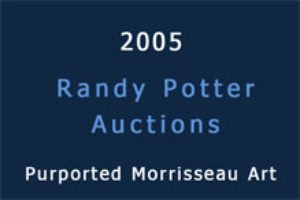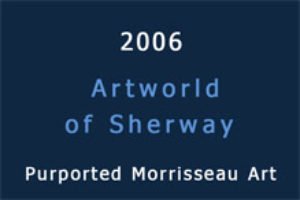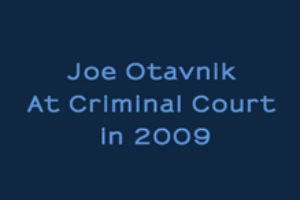 Norval Morrisseau made his views clear on the subject of fakes, imitations and copyright infringement in the following sworn declarations:
Norval Morrisseau made his views clear on the subject of fakes, imitations and copyright infringement in the following sworn declarations:
- Bearclaw Gallery
- 30 November 2004 “all of the following works…are fakes and imitations”.
- 8 April 2005 “all of the following works…are fakes and imitations”.
Affidavits sworn by Norval Morrisseau were filed in
- Joseph McLeod et al v Ritchie Sinclair (2008)
- Joseph Otavnik v Ritchie Sinclair (2008)
- Maggie Hatfield v Donna Child and Artworld Inc. (2009)
- Kevin Hearn v Joseph McLeod & Maslak McLeod Gallery (2012)
- Goldi Productions Ltd. v Ritchie Sinclair (2011)
♦ Plus additional inventory of purported Morrisseau art displayed by Bearclaw Gallery c 2005
 Loading...
Loading...
The Browne v Bearclaw Gallery Claim (2009) and The Bearclaw v Sinclair Affidavit (2008).
PDF Contents:
- Bearclaw Gallery Provenance Document filed in Browne V Bugera
- The Claim of Jonathan Browne v Jackie Bugera & Bugera Holdings (2009)
- The Bugera Affidavit in Joseph McLeod et al v Ritchie Sinclair (2008)
 Loading...
Loading...
“Because of the fact that I am one of the very few people who have worked alongside Norval Morrisseau and I have been trained by him, I am in a unique position to be able to identify methods and aspects of paintings that have been attributed to Norval Morrisseau in order to assess whether they are genuine or not,” the affidavit says. “I know things about his brush strokes, his use and choice of paint, his creation of lines, his selection of subject matter and his basic methods, which all serve to distinguish genuine Morrisseau paintings from counterfeits.”
Sinclair Quoted in the Ottawa Citizen in 2009
Collectors sue gallery over disputed painting
MORRISSEAU, MAYBE: Couple says uncertainty over painting may cost them dearly; gallery ‘stands by the authenticity’ of work
The late Norval Morrisseau, Canada’s most celebrated aboriginal artist, was known to be a great painter but a lousy speller.
So Jonathan and Julie Browne of Ottawa were not initially concerned when the Morrisseau painting they bought from Edmonton’s Bearclaw Gallery in April 2007 arrived with the following title scrawled on the back: “Grandfather Speaks of Great Ansistrail Warrior.”
The painting, supposedly done by Mr. Morrisseau in 1977, is generally known today at the Toronto court house and in various eyebrow-raising websites as
Grandfather Speaks of Great Ancestral Warriors. Shortly after paying $25,000 for the 58-inchby-61-inch neon-coloured painting, the Brownes uncovered some news far more troubling than a spelling mistake.
Mr. Morrisseau himself, according to documents filed in Ontario Superior Court, is alleged to have declared the painting a fake in 2006 in an e-mail to Heffel, an art auction house that was trying to sell Grandfather Speaks on behalf of the painting’s then owner, Joseph Otavnik, an Oshawa art collector. These documents say that Heffel then withdrew the painting from the auction.
But is the painting really a fake?
Mr. Morrisseau’s word back then, when he was seriously ill with Parkinson’s disease, was not accepted as gospel by everyone. So maybe the painting is real, after all. It depends upon whom you want to believe.
The Brownes, who tell their story on a website they created, are not calling the painting a fake but they are concerned about the uncertainty over authenticity and have filed a suit in Ontario Superior Court in Toronto to recover the cost of the artwork from Bearclaw.
“The fact that the painting had been identified by Morrisseau himself as a fake and withdrawn from auction, served to destroy the … value of the painting to the plaintiff and to any other subsequent purchases,” says a statement of claim filed Jan. 15 by Mr. Browne in Ontario Superior Court.
The painting, Mr. Browne told the Citizen, represents “a huge investment for us and the loss of this investment has significant negative implications for us, wiping out a significant portion of our savings.”
Bearclaw has yet to file a statement of defence. In an e-mail to the Citizen, Bearclaw director Jackie Bugera declined to comment on the case, except to say: “I remain very confident that we will be successful in defending this claim.”
The problems swirling around the Brownes’ painting are not unique in the multi-million-dollar Morrisseau art market. More than two years ago, the Norval Morrisseau Heritage Society, a group of six Morrisseau experts from such institutions as the National Gallery of Canada and Canadian Museum of Civilization, issued a statement warning the public about fake Morrisseaus for sale, especially on the Internet.
The exact number of true Morrisseau paintings and the quantity of fakes circulating is difficult to ascertain, at least in part because of the late artist’s erratic life. He spent years as a street person, selling works privately rather than through galleries.
The Brownes’ case is not the only one before Ontario Superior Court in Toronto. A defamation suit has been launched by five dealers in Morrisseau works against Ritchie “Stardreamer” Sinclair, a self-described Morrisseau “apprentice” who operates a website, www.morrisseau.com, in which more than 1,000 so-called Morrisseau paintings are labelled as fakes.
Some paintings that have appeared on Mr. Sinclair’s website have, at times, been listed for sale by the dealers, including Bearclaw in Edmonton. In support of an affidavit filed Jan. 5 in Ontario Superior Court, Mr. Sinclair has filed with the court notarized statements by Mr. Morrisseau sent to four of the five dealers in the last few years of the artist’s life listing specific fakes he said they were offering for sale.
The accuracy of Mr. Morrisseau’s statements has not been tested in court nor has evidence been submitted to show how the galleries responded to Mr. Morrisseau’s complaints. However, one of the five dealers, Joe McLeod of Maslak McLeod Gallery in Toronto, told the Citizen he withdrew from sale all the paintings questioned by Mr. Morrisseau.
The controversies over the Brownes’ Grandfather Speaks began in 2006 when the painting, along with some other Morrisseaus owned by Mr. Otavnik, were listed for auction with Heffel.
According to Mr. Sinclair’s Jan. 5 affidavit, Mr. Morrisseau and Gabe Vadas, the artist’s “adopted” son and business partner, sent an e-mail Sept. 12, 2006 to Heffel declaring the works to be fakes. The affidavit says Heffel subsequently withdrew the art from the auction. The affidavit also says Mr. Otavnik later placed Grandfather Speaks with Bearclaw Gallery. The Brownes saw the painting on Bearclaw’s website and bought it.
“We were struck by it,” said Mr. Browne in an interview.
Bearclaw is an established Edmonton gallery selling First Nations works since 1975. The gallery’s roster of stars includes some of the biggest names in aboriginal art, including Daphne Odjig, Alex Janvier and Jane Ash Poitras.
Ms. Bugera has declined to be interviewed. However, before the launch of the Brownes’ suit, Ms. Bugera e-mailed a statement to the Citizen in which she said the gallery “stands by the authenticity” of Grandfather Speaks and another Morrisseau painting Mr. Browne and his wife, also known as Julie Witmer, bought there. Both husband and wife hold PhDs and operate an Ottawa consulting business.
“Over the course of selling Norval Morrisseau works over the past 30 years, Drs. Browne and Witmer are the first customers who have ever questioned the authenticity and provenance of our paintings,” Ms. Bugera wrote. “As with any other customer, Bearclaw Gallery has treated Drs. Browne and Witmer in a manner not inconsistent with the standards expected of any other fine art gallery in Alberta.”
Ms. Bugera said the gallery was initially prepared to exchange Grandfather Speaks upon learning of the Brownes “specific reservations.” That position changed after “the great lengths” the Brownes took to express their “dissatisfaction.” The prospect of any “exchange or refund” was removed from the table. After the Brownes launched the suit against Bearclaw, Ms. Bugera said she could not comment on a matter before the courts.
The Brownes say they have been unable to find anyone, including art galleries specializing in Morrisseau works or experts at the Norval Morrisseau Heritage Society, willing to sign a document saying the painting is real or a forgery.
The heritage society is trying to assemble a list, or catalogue raisonne, of all true Morrisseau works. In the meantime, the group is refusing, publicly at least, to label what is real and what is fake.
In an interview with the Citizen earlier this month, Mr. Otavnik said he had offered to refund the Brownes their money for Grandfather Speaks. But there was a condition.
“They told me that members of the Norval Morrisseau Heritage Society called it a fake,” Mr. Otavnik said. “I said, ‘Perfect; put that in writing and I’ll refund your money.’ They never did.”
The Brownes produced no statement in writing from experts, says Mr. Otavnik, “because I could sue those people.”
Mr. Otavnik does not accept the statement from Mr. Vadas and Mr. Morrisseau that the painting is a fake. Some people, Mr. Otavnik says, are declaring painting fakes as a way of “controlling the market.”
Reached by telephone at his home in Nanaimo, B.C., Mr. Vadas refused to comment on any aspects of the Morrisseau controversies saying he did not want to unleash more “harassment” against him. Mr. Vadas did invite the Citizen to send him written questions. That was done. But, in an e-mail, he declined to answer any of them.
Authenticating Morrisseau paintings has been complicated by the fact the Art Dealers Association of Canada issued a notice March 13, 2007 saying its members would no longer issue “certificates of authenticity” of the artist’s paintings and that the Norval Morrisseau Heritage Society is “the sole authority for the authentication of works by Norval Morrisseau.” But the society won’t issue signed statements either.
So, where are the alleged fakes coming from? Various prominent figures in the Morrisseau art market accuse each other of involvement in the production of forgeries. Then, there are the seemingly wild accusations that organized crime is churning out Morrisseau fakes from “factories” in Thunder Bay, that these “artists” are being paid in illegal drugs and that money-laundering is involved.
The Brownes say they went to the Ottawa police in November with their concerns over the authenticity of Grandfather Speaks and were told not to expect any feedback for three months.
Lawsuits and inflammatory websites abound in the Morrisseau art market. Mr. Otavnik, for example, won an out-of-court settlement against Mr. Vadas for $11,000 after the Heffel intervention in 2006.
The settlement, which did not involve the painting eventually purchased by the Brownes, has been interpreted in vastly different ways by the parties involved.
Mr. Otavnik’s conversation with the Citizen was peppered with insults directed at many prominent players in the Morrisseau drama. Some of his harshest criticism was directed at the Brownes. He is also no fan of Mr. Sinclair and has launched a suit in Small Claims Court in Whitby seeking damages that he says Mr. Sinclair’s website and Kinsman Robinson Gallery in Toronto have done to his business.
Mr. Otavnik is not part of the much larger defamation suit by the five art dealers against Mr. Sinclair, who claims to have worked with Mr. Morrisseau for several years before the artist’s death Dec. 4, 2007. However, all five art dealers, in affidavits filed in court, say Mr. Otavnik was the person who first notified them of Mr. Sinclair’s website.
A statement of claim filed Dec. 17 in Ontario Superior Court in Toronto by the dealers says Mr. Sinclair’s website is “causing real and substantial harm” to their businesses by scaring off customers. The dealers include Joseph McLeod of Maslak McLeod Gallery in Toronto, James White of White Distribution Ltd. of Caledon, Ont., Donna Child of Artworld of Sherway Gallery in Toronto, Sun Nam Kim of Gallery Sunami in Toronto and Jackie Bugera of Bearclaw in Edmonton.
“Sinclair’s actions against the plaintiffs have been reckless, vindictive and malicious,” the statement of claim says. “Sinclair has made no attempt to examine the paintings in question or to review the plaintiffs’ evidence of the authenticity of the paintings. Instead, he has recklessly made bald allegations of fraud based solely on viewing images of the paintings displayed on the Internet. Sinclair has either knowingly posted falsehoods or he has shown a reckless disregard for the truth of his allegations.”
The dealers’ accusations have not been proven in court and Mr. Sinclair has yet to file a statement of defence. However, in the Jan. 5 affidavit he filed with Ontario Superior Court, Mr. Sinclair discussed his years of working with Mr. Morrisseau in various locations, studying the style and content of his paintings.
“Because of the fact that I am one of the very few people who have worked alongside Norval Morrisseau and I have been trained by him, I am in a unique position to be able to identify methods and aspects of paintings that have been attributed to Norval Morrisseau in order to assess whether they are genuine or not,” the affidavit says. “I know things about his brush strokes, his use and choice of paint, his creation of lines, his selection of subject matter and his basic methods, which all serve to distinguish genuine Morrisseau paintings from counterfeits.”
Justice Thomas Lederer issued an interim ruling Dec. 8 on the art dealers’ request to “close down” Mr. Sinclair`s website. The judge said the website could remain in operation, at least for now, but warnings had to be posted on the site saying that the opinions were solely those of Mr. Sinclair and are the subject of a defamation suit. Mr. Sinclair has complied with that order. The case is scheduled to resume March 17.
Meanwhile, the Brownes’ website also contains an image of another supposed Morrisseau painting, Bear and Berries, the couple also bought from Bearclaw. Their research has led them to wonder about the authenticity of that painting as well. Details surrounding Bear and Berries have yet to be posted on the Brownes’ website. But stay tuned. This story is far from over.






